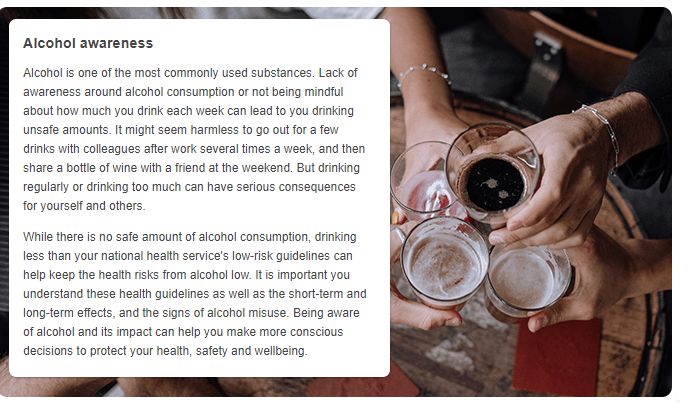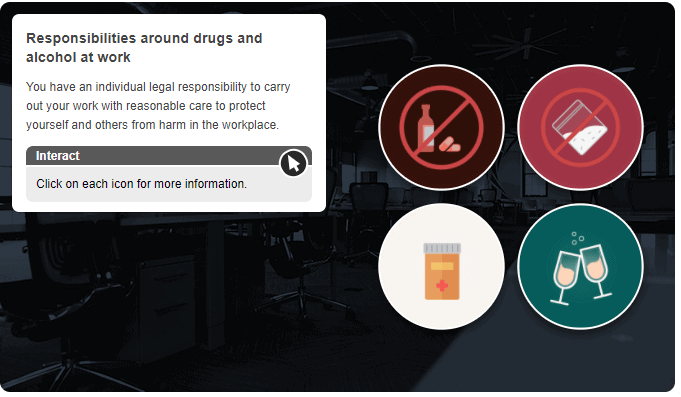Introduction
Substances refer to anything that can cause mind-altering effects. This includes alcohol, prescription or over-the-counter medication, illegal drugs and psychoactive substances. Some people might only use substances for recreational or medical purposes, but drinking alcohol and using drugs can lead to misuse.
A person might be misusing alcohol if, for example, they drink in a way that is harmful to their health, relationships or work. Or they might have a substance misuse problem if they are taking more than the recommended amount of prescription drugs or over-the-counter medication, or if they are using them for purposes other than those intended. Substance misuse doesn’t necessarily mean someone is addicted or dependent on a substance, but misuse could eventually lead to dependence.
Who does it affect and to what extent?
People of all different ages, ethnicities, genders, and social and economic backgrounds can suffer from alcohol and drug problems. TUC estimated that around 1.5 million people in the UK are addicted to over-the-counter and prescription medication. The UK government estimates that 10.8 million adults in England alone consume alcohol at levels that put their health at high risk, with 1.6 million adults considered to be alcohol dependent.
Drug and alcohol misuse can affect individuals’ health and wellbeing. They can change how we see things and behave, which can have short-term and long-term effects on our physical and mental health. Alcohol is one of the biggest causes of early deaths for people between 15 and 49 years old, resulting in about 20 deaths per day.
Since the start of the Covid-19 pandemic, many people have turned to or relied on substances to cope with rising levels of stress, anxiety and other mental health issues. The charity organisation, Alcohol Change UK, found that one in three drinkers were drinking more or at high-risk levels since the start of the pandemic. Addiction rehabilitation services are also worried about more relapses due to social isolation and lack of accessibility to support services.

How does this impact the workplace?
Substance misuse has wider societal implications, including in the workplace. Drugs and alcohol misuse can harm organisations in several ways, for example:
- Increased safety risks, leading to more accidents and near misses.
- Loss of productivity – estimates show that about £7.3 billion is lost per year in the UK from decreased productivity due to alcohol alone.
- Higher absenteeism – 3 to 5% of workplaces absences are because of alcohol.
- Financial and reputational damage.
- Legal concerns over employee behaviour.
- A decrease in morale and employee retention.
A person doesn’t necessarily have to be misusing a substance or dependent on it for it to have a negative impact on the organisation. For example, an employee could be taking prescription medication according to medical guidelines, but which causes them to be unproductive and unfit to safely carry out their work tasks.
During the Covid-19 pandemic, a study found that almost half of respondents have left work early to have a drink, and around the same number of people had had an alcoholic drink while working.
How can employers reduce the risks?
While employers generally don’t get involved in employees’ private lives, they have a legal responsibility to protect everyone’s health, safety and wellbeing in the workplace under the Health and Safety at work Act 1974.
There are four things you can do to help protect employees’ health and safety and reduce the risks of harm in the workplace.
1. Have a clear drug and alcohol policy
Your organisation should have a drug and alcohol policy outlining information such as:
- What substances are and what substance misuse means.
- The risks of consuming alcohol or using drugs.
- Signs that might indicate substance misuse or dependence.
- Employee responsibilities and the law on drugs and alcohol at work.
- The impact of drug and alcohol misuse on the organisation.
- What to do if an employee feels they are misusing drugs or alcohol.
- How the organisation will help and support the employee.
- Situations that would require the organisation to take disciplinary action, for example, if an employee is dealing drugs at work.
- When and in what circumstances the organisation would need to carry out testing or searches.
This policy will ensure that substance misuse issues are dealt with consistently and effectively so everyone remains safe and healthy at work. This policy should also be regularly reviewed and updated where necessary.
2. Use online training to build awareness
Your policy should outline all of the necessary information employees need to know about drugs and alcohol at work. But sending out a policy to all of your staff doesn’t ensure that they read it or necessarily understand all of the information.

You can help ensure compliance and understanding of the material – therefore, helping to prevent and manage substance misuse at work – by rolling out online training. The training can include the information outlined in your policy and any additional information using interactions, scenarios and imagery to engage your workforce.

The EssentialSkillz Drugs and Alcohol at Work eLearning course covers the main points in a drug and alcohol policy helping people:
- Create healthier habits around alcohol consumption.
- Recognise signs of substance misuse.
- Know where they can get help and support if they have or believe they are misusing substances.
Like all EssentialSkillz courses, our Drugs and Alcohol at work course can be customised to meet your needs, enabling your workforce to understand the specific policies and procedures you have developed for your organisation.
3. Align policies with organisational culture
Many policies will highlight the risks of drinking alcohol and may discourage coming into work hungover. But consider how the information in your policy aligns with the organisational culture. Does your organisation encourage teams to go to the pub after work, or organise social events that mainly involve alcohol?
Your organisational culture needs to reflect what is in the drug and alcohol policy.
A drinking culture in the workplace, where most social events involve alcohol, can increase the likelihood of substance misuse, and be counterproductive to promoting a safe and healthy work environment.
A study found that 60% of respondents felt virtual happy hours with colleagues contributed to drinking more during the Covid-19 pandemic.
4. Provide support
If an employee states that they are misusing substances or if substance misuse becomes a workplace problem (for example, someone regularly comes to work under the influence of alcohol), employers should aim to take a supportive, constructive approach, where possible. Substance misuse and dependence are considered medical problems and should be handled the same way as other medical or psychological conditions. You should:
- Encourage the employee to get additional support from the HR department, the company’s occupational health adviser or the employee assistance programme.
- Suggest they get help from their GP or a specialist charity or organisation for advice, support or treatment.
- Consider giving them some time off to work through the problem.
- Think about whether the substance misuse could be prompted by workplace problems (for example, stress from unreasonable deadlines or bullying at work), and then work with the employee to improve the situation.
While employers should first try to take a supportive approach, sometimes disciplinary action might be necessary, for example, if they broke the law at work, or it resulted in gross misconduct at work.

Conclusion
Drug and alcohol misuse can affect personal health and wellbeing, but it also negatively impacts teams, organisations and wider society. Employers can take proactive steps to reduce the risks of substance misuse in the workplace by creating a drug and alcohol policy and ensuring understanding of the material by enrolling staff on online awareness training.
But organisational efforts don’t end with policies and training. Employers must ensure their policies are enforced and reflected in the organisation’s culture and practices, and that cases of substance misuse are handled appropriately using a supportive and constructive approach.








